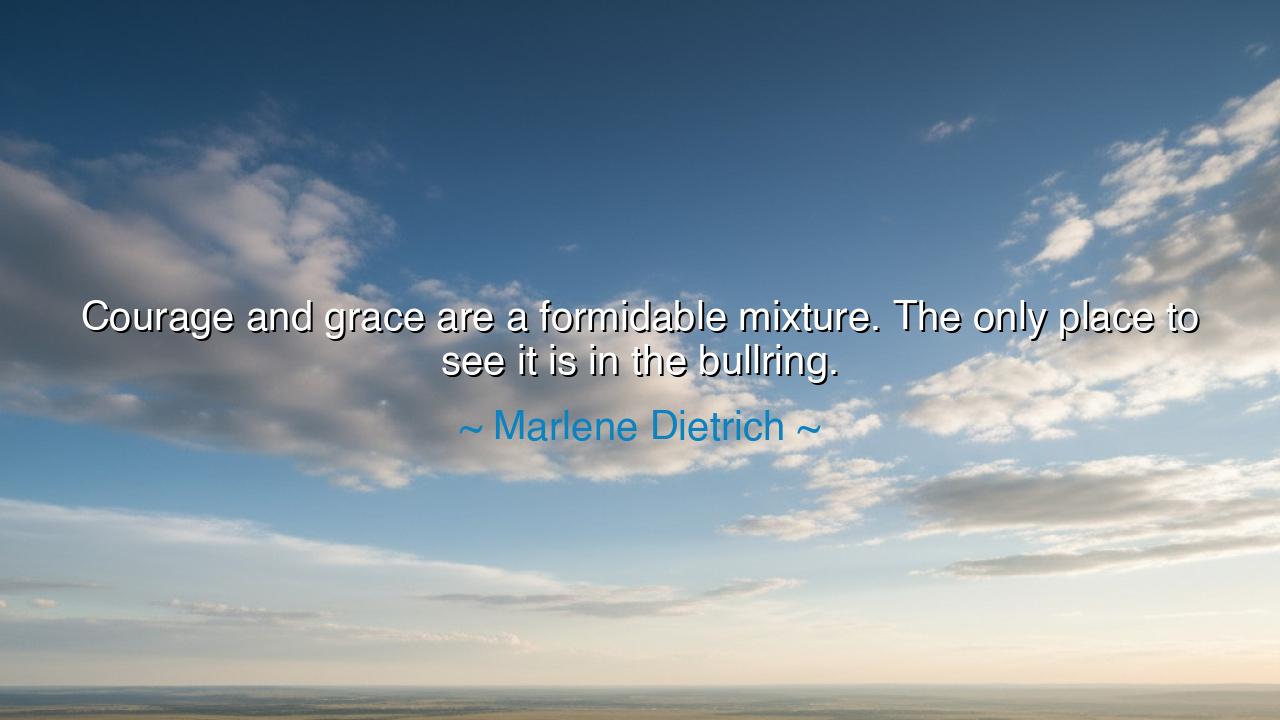
Courage and grace are a formidable mixture. The only place to see
Courage and grace are a formidable mixture. The only place to see it is in the bullring.






When Marlene Dietrich, the timeless icon of elegance and strength, declared, “Courage and grace are a formidable mixture. The only place to see it is in the bullring,” she was not merely speaking of the sport of bullfighting, but of the human condition itself. Her words are a meditation on the nature of bravery — that true courage is not only a matter of strength or defiance, but of grace: the ability to move with dignity and beauty amid danger, fear, and pain. Dietrich saw in the bullring a symbol of life’s greatest struggle — that delicate, perilous dance between power and poise, between life and death, between raw will and refined spirit. It is in this tension that the soul reveals its nobility.
To understand her meaning, one must look beyond the literal image of the bullfight. The bullring is the stage of existence itself — the arena where human beings face their battles, seen and unseen. The bull represents chaos, fear, and the uncontrollable forces of life; the matador, with his measured gestures and calm composure, embodies grace under fire. His courage is not reckless; it is disciplined, artful, almost serene. In the face of death, he does not lash out wildly, but moves with elegance, as though acknowledging that beauty can exist even within struggle. Dietrich’s insight is that courage without grace is mere brutality, while grace without courage is empty performance. Only together do they form the formidable mixture that defines greatness.
Marlene Dietrich herself was no stranger to the bullring of life. Born in Germany and rising to fame in an age of turbulence, she defied convention, resisted the fascism that devoured her homeland, and stood boldly for freedom and love in an era that often punished both. During the Second World War, she entertained Allied troops on the front lines, risking her safety for the sake of morale and conviction. Her life was a living example of the union she spoke of: courage to stand for what is right, and grace to do so with dignity, compassion, and poise. She taught that power need not roar; it can whisper, and still command the world.
The origin of her thought can also be traced to the ancient understanding of heroism. The Greeks revered arete — excellence in all things, moral and physical. To them, the hero was not merely the strong or the victorious, but the one who faced destiny with elegance and restraint. Think of Achilles, fierce in battle yet noble in spirit, or Odysseus, whose cunning and patience reflected a refined courage. The Romans, too, prized virtus — the balance between valor and discipline. In every tradition, the truest strength is measured not by how loud or violent one is, but by how composed, how graceful, one remains when the storm arrives. Dietrich, with her artist’s soul, simply rephrased that eternal wisdom for the modern world.
Consider, too, the example of Mahatma Gandhi, who embodied courage of an entirely different kind. He faced an empire not with weapons, but with grace, wielding truth and nonviolence as his sword and shield. His courage was gentle, his defiance calm — yet he moved nations. Like the matador in the bullring, he met the bull of injustice with a stillness that disarmed rather than destroyed. This is the kind of formidable mixture Dietrich admired: the strength that does not seek to dominate, but to elevate; the grace that does not avoid conflict, but transforms it into something sublime.
To cultivate courage and grace in one’s own life is to embrace the paradox of being both warrior and artist. It means standing firm in the face of fear, yet moving through it with beauty. It means speaking truth with kindness, acting decisively without cruelty, enduring pain without bitterness. In the bullring of daily life — where responsibilities, losses, and trials charge at us like beasts — it is not enough to be brave; one must also be graceful. For courage gives us power, but grace gives that power purpose. Without grace, courage destroys; without courage, grace fades. Together, they form the harmony of a noble life.
So, my listener, remember this teaching as you face your own battles: meet the bull with courage, but move with grace. When life confronts you with fear, do not answer with rage; answer with strength clothed in calm. When the world demands aggression, show instead the power of restraint. When hardship seeks to crush you, let your response be not despair, but dignity. For the measure of a soul is not only in how bravely it fights, but in how beautifully it endures.
And thus, as Marlene Dietrich saw, the bullring is not a place of cruelty alone — it is a mirror of existence, where the brave and the graceful dance with fate. Let that image guide you: be fierce, but never lose your elegance; be bold, but never lose your compassion. For in the union of courage and grace, humanity finds its most radiant strength — and even in the face of death, the spirit learns to move like art.






AAdministratorAdministrator
Welcome, honored guests. Please leave a comment, we will respond soon